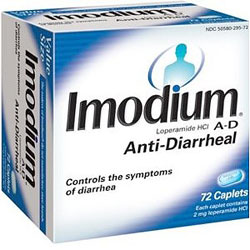Chronic diarrhea is defined as loose stools that last for at least four weeks. This usually means three or more loose stools per day. There are many possible causes of chronic diarrhea. Treatment is aimed at correcting the cause of diarrhea, firming up loose stools and dealing with any complications of diarrhea.


Chronic diarrhea is defined as loose stools that last for at least four weeks. This usually means three or more loose stools per day. There are many possible causes of chronic diarrhea. Treatment is aimed at correcting the cause of diarrhea, firming up loose stools and dealing with any complications of diarrhea.
Chronic diarrhea can have a substantial impact on the quality of life and overall health. At its mildest, diarrhea is an inconvenience and at its worst, it may be disabling and even life threatening. Fortunately, effective treatments for this complaint are available.
A wide range of problems can cause chronic diarrhea; some of the most common causes include irritable bowel syndrome, inflammatory bowel disease (Crohn’s disease and ulcerative colitis), malabsorption syndromes, and chronic infections.
Crohn’s disease is a condition that affects the digestive tract. The cause of Crohn’s disease is unknown. The most common symptoms of Crohn’s disease include diarrhea, abdominal pain, weight loss, and fever.
Some people with Crohn’s disease also have problems outside of the digestive tract, including a skin rash, joint pain, eye redness, and, less commonly, liver problems.
There is no cure for Crohn’s disease, but there are medicines that can help to keep the disease under control. If medicine does not control symptoms, surgery might be an option to remove the diseased part of the colon.
There are also many other less common causes of chronic diarrhea
One of the most common causes is irritable bowel syndrome. Irritable bowel syndrome can cause crampy abdominal pain and changes in bowel habits.
This can either be diarrhea or constipation and even both. Irritable bowel syndrome can develop after having an infection.
Inflammatory bowel disease is another common cause of chronic diarrhea. There are several types of inflammatory bowel disease, two of the most common of which are Crohn’s disease and ulcerative colitis. These conditions may develop when the body’s immune system attacks parts of the digestive tract.
Infections such as intestinal infections are a cause of chronic diarrhea. Infections that cause chronic diarrhea can be seen in people who travel or live in developing countries. Intestinal infections can also develop after eating contaminated food or drinking contaminated water or unpasteurized milk.
Endocrine disorders such as overactive thyroid (hyperthyroidism) can cause chronic diarrhea and weight loss. Diabetes can cause chronic diarrhea if the nerves that supply the digestive tract are injured.
Food allergy or sensitivity can cause chronic diarrhea. People with celiac disease often have diarrhea and weight loss.
Medicines, herbs, and dietary supplements can cause diarrhea as a side effect. To determine if a medicine could be the cause of the diarrhea, a person need to review his medicines with his doctor, nurse, or pharmacist.
Evaluation of the chronic diarrhea could be done by carrying out tests. Blood, stool, and urine tests can help to find the underlying cause of diarrhea.
If these tests do not find the cause, other approaches may be needed, including X-rays or procedures such as colonoscopy an exam done for large intestines or sigmoidoscopy done on part of large intestine known as sigmoid colon.
Treatment
Treatment of chronic diarrhea aims to eliminate the underlying cause (if the cause is known), firm up the bowel movements, and treat any diarrhea related complications.
The underlying cause of chronic diarrhea should be found and treated whenever possible. For example, infections may be treated with antibiotics.
In people with Crohn’s disease or ulcerative colitis, long-term treatment and follow-up is needed.
In some cases, treatment may be as simple as eliminating a food or medicine. For people with lactose intolerance, this may include foods or drinks that contain lactose.
Other ingredients that are known to cause diarrhea include sugar-free products made with sorbitol and foods made with fat replacements. Certain medicines such as laxatives and antacids can also cause diarrhea.
Diarrhea treatments include, bismuth sold as Kaopectate, Pepto-Bismol. Other medicines such as loperamide sold as Imodium, diphenoxylate (Lomotil) are also effective.
Ends


